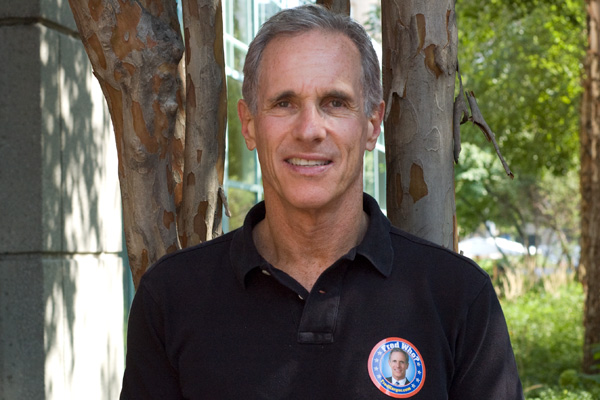
Interview
Fred KargerAug. 6, 2010 in Washington, DC
INTRODUCTION | PART 1-A Career in Campaigns | PART 2-The Exploratory Effort

Fred Karger, 60,
is best known as founder and director of Californians
Against Hate, the
independent effort against Prop. 8 in 2008. Before that, he had worked
for close to three decades as a Republican consultant and
strategist. In April 2010 Karger launched a presidential
exploratory effort at the Southern Republican
Leadership Conference in New Orleans [statement].
Over the
years there have been many longshot presidential campaigns that
ultimately have not
had much impact. One
naturally has considerable skepticism about these
unknown candidates. For
example, on the Republican side, Titan International CEO
Morry Taylor ("the Grizz") spent millions in
1995-96 and in 1999 Illinois businessman John Cox spent close to $1
million.
Karger's
bid,
if
he
runs,
could
be
significantly
different
than
those
campaigns.
While
the
Taylor
and Cox efforts seemed largely ego driven, Karger is
driven by a cause. He
would be first openly gay candidate to seek the nomination of a
major political party as its presidential candidate.
Karger stands
apart not
only as a gay
Republican, but as a moderate who is pro-choice. In an era when Republican candidates often seek
to outdo each other when it comes to their
conservative bona fides, a Karger candidacy could result in some
interesting situations. In May, for example, Karger
received an
e-mail from Iowa RNC committeeman Steve
Scheffler stating, “...I will work overtime to help ensure that your
political aspirations are aborted right here in Iowa.” Other
Republicans have disavowed that view, but a Karger candidacy would
still run counter to prevailing tendencies in the
party. Karger's unique track could give him staying power.
Karger's decades of experience
working as a strategist and consultant should prove useful. His presidential
exploratory effort has the catchy slogan "Fred Who?" and it
already
has
many
of
the
trappings
of
a
full
blown
campaign
including
"Fred
Who?" tee-shirts, lapel stickers, flag pins,
and "the much sought
after" Fred Frisbees which he plans to distribute throughout New
Hampshire.
New Hampshire is
clearly a central part of Karger's strategy; he has already made four
trips there (>), he has found quite a few people
willing to help, and he even plans to rent a house there. At this
point, however, he is the only game in town (the only one to have
established a committee), and he'll have to think carefully about
pacing himself, for the primary is still 18 months off.
Karger envisages that
if he can raise $5-6 million dollars,
he can wage a credible campaign that could achieve a breakthrough in
the way
the campaigns of Shirley Chisolm and Jesse Jackson did for black
Americans.
Democracy in
Action
interviewed Fred Karger over a light lunch at the Park Hyatt. Karger
and travelling aide Kevin Miniter
had just driven down from
Baltimore where he was attending the Equality Federation's Summer
Meeting. He also recently finished his fourth New Hampshire trip.
In Part 1 of the
interview I wanted to get a sense of Karger's
political experience from his first political memory to his various
experiences in
presidential campaigns. Karger started out in volunteer
roles when he was growing up in a suburb of
Chicago in the mid-1960s. In the mid-1970s he moved to
California where he worked with and learned from Bill Roberts, the
consultant who managed Reagan's 1966 gubernatorial campaign.
Karger worked at The Dolphin Group from 1977 to 2004. He has had
small roles on nine presidential campaigns. Particularly
interesting,
in 1984
he followed Mondale around running the RNC's Republican Fact and
Information Store, and in 1988 he headed up an independent committee
that travelled with the Willie Horton
victims. Karger is a rare breed, a moderate Republican, harkening
back to figures like Sen. Chuck Percy and Gov. Nelson Rockefeller, yet
he
still names Ronald Reagan as a leader whom he admires most.
In
Part 2, Karger talks about the origins of his exploratory
effort. He describes himself as a frustrated candidate who
couldn't run because of his "deepest darkest secret" and says that
coming out has freed him. I wanted to get behind the scenes
a
bit and find out and what an individual does when one is exploring a
president campaign and the sorts of people one talks to. Karger
discusses some of his meetings, and it's clear
there is a lot of networking involved. Karger describes himself
as an "Independent Republican" and sees himself "transpartisan" figure
able to bridge the partisan divide so evident in American politics
today. The
interview
takes a slight detour into the question of whether politics is broken
but then gets back into the nuts and bolts of the exploratory
effort. Karger is already planning to run his first ad, "Good
Morning, New Hampshire."